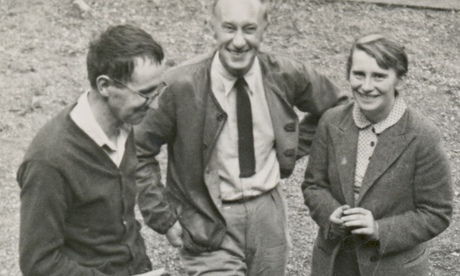
In 1931 German playwright and poet Bertolt Brecht met a young actor, a woman called Margarete Steffin, with whom he was to become both intimately and intellectually involved. They met at a play rehearsal and she subsequently acted in Brecht's The Mother, then became a collaborator in his writing. Steffin typed up his work, corrected it, made suggestions, translations and drove him to greater efforts. In a late poem Brecht called her his "little teacher".
Steffin, who was from a proletarian Berlin family, could also supply for his political plays the details of real working-class life, of which the more comfortably raised Brecht had no direct experience. The composer and Brecht collaborator Hanns Eisler wrote of Steffin: "She was Brecht's most valuable collaborator. I have to say that Fear and Misery of the Third Reich – the working-class scenes – could not have been written without Steffin."
But Steffin was already suffering from tuberculosis, the terrible collateral of such knowledge, and over the next decade Brecht paid for her treatment at sanatoriums across Europe as her health declined. They also began a relationship, and the two lovers exchanged passionate, touching and lustful letters and poems, a selection of which are being presented by Modern Poetry in Translation and performed by actors on 19 July as part of the Southbank Centre's Poetry International and Festival of Love.
Brecht needed women, and the number of other lovers and admirers around him clearly tormented Steffin. She opens a poem with the words: "Just imagine all the women you/ Have had come to your bed ..." and in a letter to Brecht she writes about how she dreams of seeing him with various women and wakes agitated. "I am wholly yours," she writes to Brecht in 1934.
His poems to her are touching and protective, but also openly sexual and explicit. In one poem he lists all the places they have made love: "Excited by pianos in the monastery .../ Furnished; you threw the key down from the balcony .../ In that hotel – in one room, in both rooms ..." Her laconic note to this poem reads: "You forgot that time in the car."
In 1933, when Hitler came to power in Germany, Brecht was forced to flee and he spent the next 14 years in exile, travelling from country to country and eventually leaving Europe on a train through Siberia to the US. He took his family, his wife and his retinue and Steffin left Germany, too.
By 1940 they had reached Helsinki, and their writing, translating and editing work continued unabated, although by then Steffin was critically ill. In May 1941 Brecht's party were in Moscow and Steffin was admitted to a sanatorium. Brecht and his family travelled east, and a few days later Brecht heard that Steffin had died. He wrote:
Remembering my little teacher
Her eyes, the blue angry fire
And her worn cloak with the wide hood
And the wide hem, I named
Orion in the sky the Constellation of Steffin.
Looking up and contemplating it, shaking my head
I believe I hear a faint coughing.
The poet and translator David Constantine, and the Brecht specialist and translator Tom Kuhn have translated for the first time the exchange of poems and letters between Brecht and Steffin. Kuhn said of the relationship that "Steffin was one of the great (and tragic) loves of his life. The story of their relationship is a moving one, which takes us to the heart of some very big issues: writing and politics, gender politics in modernism, antifascism and the individual life."
A Poem by Margarete Steffin
I live almost as high as him. And so
Making his way into my room at night
And robbing me of my beauty sleep is quite
An unproblematic thing for him to do.
He comes in quiet, sits by the bed at ease.
Before I've covered up my nakedness
He grins at it with that sly grin of his
And sins the time away with what he sees.
With fingertips he plays on leg and knee
On thigh and hip, kisses my throat softly
Fondles my breast and strokes my hair.
He is a connoisseur of every melody.
Vanishes without a sound when he's fooled me
And I don't know was it really him who was there.
Translated by David Constantine and first published in Modern Poetry in Translation
• Brecht and Steffin: Love in a Time of War and Exile is Love in a Time of War and Exile is at the Southbank Centre's Poetry International on 19 July

